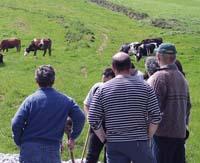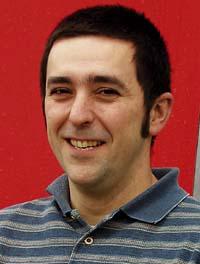Livestock has pastures
2006/05/01 Galarraga Aiestaran, Ana - Elhuyar Zientzia Iturria: Elhuyar aldizkaria

Mount Eskaltzu is located on the road from Zarate to Andatza, in Gipuzkoa. The garbage dumps of the area take the cattle to their pastures. The cows are in a privileged environment for their good development: they have good grass, enough water, suitable roads up there... It seems that nothing has changed there in the last hundred years. However, there have been changes and not of any kind.
In fact, in these pastures were introduced a year ago by eight baserritarras of the Association of Ranchers Eskaltzugain. Previously they had to carry out tasks of conditioning the pastures. In fact, the area was abandoned, with scrubs and prayers. To become pastures again, they had to brush, plow the soil, fertilize, sow the seed, bring water, make watering holes, fence, fix the road, etc.
After all, the grassland was prepared for livestock and in April last year the first grassland opening was held on Mount Eskaltzu. In fact, it does not seem to be enough for a celebration, but they have achieved more than restoring the pastures in Eskaltzu.
This area comprises fifteen small privately owned land. Zizurkil City Council signed an agreement with the owners of the land, in view that all groups were suitable for grazing. Thus, the owners have ceded the land to the City Council for fifteen years and the City Council has offered it to the ranchers of the Eskaltzugain Livestock Society.
Eskaltzu pastures are an example of the work they do in Tolomendi. These projects are not easy to carry out, but they have shown that they are a good way to solve a problem, since there are many lands like those of Eskaltzu a year ago, abandoned and without exploitation.
Rapid evolution

Iker Karrera is manager of Tolomendi, a rural development association that knows how land use has changed in Tolosaldea and how it has affected the baserritarras.
According to him, most of the current pine forests were grasslands or farmland 60-70 years ago. If we went back for centuries, in the area predominated the Atlantic forest, but as the population increased, the forests were deforested, giving rise to pastures and fields of cultivation. Subsequently, during industrialization, the activity changed and the owners of the land decided to plant pine.
But that time has also passed, and now pine does not give as much money as before. In addition, people do not need to live those lands, everything
Therefore, many grounds are totally abandoned, especially if they are not large and not near the roads.
It is also necessary to take into account, because of the custom of sharing among the descendants, that the lands in general are small. On the other hand, agricultural machinery is currently used, which has also influenced. In the words of the race, "we have passed very fast from the carts pulled by the animals to the tractors of horses, and the infrastructures have not adapted so quickly. So in some meadows and fields you can't work as you do today."
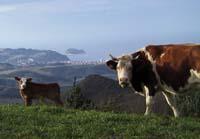
The land located in the urban environment and in the vicinity of the roads are not used, although they are suitable for agriculture and livestock. The race does not correspond to those who say there is no agricultural land. In his opinion, "the soil exists, but it is blocked. While the owners expect to change the rating of land near the village, they don't want to give the land to anyone. And if one day they have a building license, they hope to earn money by selling the apartments to the construction company. On the contrary, they fear losing their rights in case of renting land, so there are so many sections blocked."
So things, some farmers have no place to grow livestock or to install orchards. They do not have land and the owners do not want to rent them in the long term. In this situation, the baserritarras cannot risk doing work to improve the leased pastures, since they do not know until when they can stay there.
Looking for solutions
Tolomendi's job is to solve the situation by combining the interests of all. In public areas, after contacting the Provincial Council and the City Council, a technician elaborates the project and performs the necessary tasks for the restoration of pastures. In the case of Zizurkil, the land belonged to the private property and were transferred by the owners to the City Hall through the initiative launched with the collaboration of Tolomendi.
For the race, this is the most interesting aspect of the project, that is, that a public entity assumes the management of privately owned land. It is, in a certain way, a road against the old mills. As a consequence of the disentailment law, the land previously owned by the municipalities became private, but not all. Some municipalities maintained communal land, although the management of many of these lands was entrusted to individuals. It is what is known as Ondazili, where baserritarras exploited grass, chestnuts, wood...
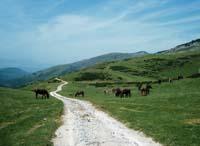
Now the opposite is happening: rural development associations like Tolomendi want private property lands to be managed through public entities so that they do not leave and the garbage dumps can take advantage of it. In addition, they want to ensure that in the future they continue to have the same use. In fact, in the old villages, the eldest son followed the paternal path, but today this custom has been lost, so this model of productive organization does not guarantee at all the continuity of a hamlet.
On the other hand, similar initiatives are also being promoted in forests through the Basoz organization, created by the Basque forestry associations.
Without far
In addition to the mountain terrain, several projects have been carried out in the urban environment, such as Elduain (Gipuzkoa). Elduain is a very steep municipality, surrounded by mountains and forests, which, despite the strength of agriculture, in recent years is losing importance.
Elduain has some meadows and fields of cultivation between the forest and the houses, but as lately no one exploits them, the forest was beginning to approach the houses. Therefore, the City Hall was concerned. Together with those of Tolomendi they have analyzed the problem and have developed a project.
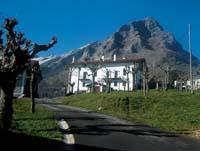
These plantations are not suitable for working with machinery, so grazing is the simplest solution for their exploitation and thus prevent entry into the forest. Finally, the four owners of these plantations have delegated the lands to the City Hall, where a young man has been in charge of raising a herd and organizing a cheese factory.
This type of project aims to give those who want to dedicate themselves to agriculture the opportunity for those who want to work on land to have land and, at the same time, to endure the landscape, culture and other values proper to rural peoples.
